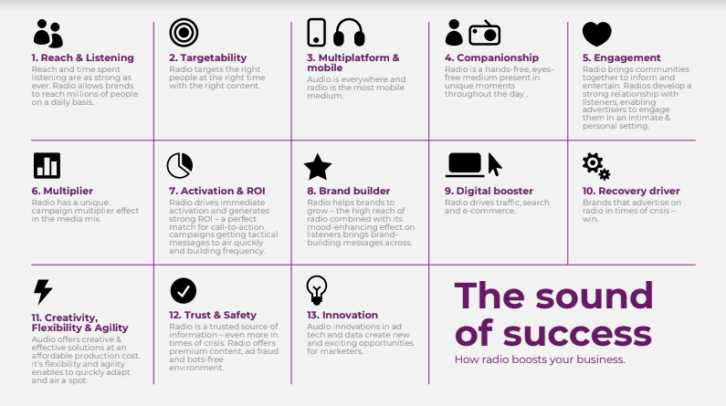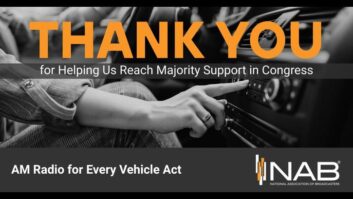The author is radio director of egta, a non-profit association based in Brussels, a European trade body that represents the interests of radio and television sales houses.
Few if any current developments have moved faster than the digital evolution. The pace of digital change, only accelerated as a result of the COVID crisis, is unprecedented and has disrupted the entire media industry. The audio landscape was equally impacted and is now in constant flux.
Radio has always been a mobile medium and a trusted companion. But technological advances have amplified ATAWAD listening — available anytime, anywhere and on any device. The development of new delivery technologies (5G, Wi-Fi, DAB+), connected devices (smart speakers, hearables) and an increase in sound quality (3D audio, noise cancellation), combined with the arrival of new players investing in the audio sphere, have resulted in a gigantic offering of audio content and formats.
Audio has become ubiquitous in our lives.
In this increasingly fragmented and complex media landscape, radio companies face challenges in various advertising markets, demonstrated by the significant gap between the volume of radio consumption and advertising investment.
While all the evidence proves the strong performance of radio when delivering real business growth, there is a disparity between the evidence and the general market perception.
Does radio have a marketing problem?
It is in this environment that the World Radio Alliance has been created.
During the 25 years I’ve worked in the advertising industry, I have often heard that radio has become obsolete — more often than hearing its strengths highlighted. But even if radio consumption has eroded since its peak, the research consistently shows that radio is key in the media mix to boost brands’ business and is the centrepiece in the evolving audio ecosystem.
Every day, radio reaches 70% of the population, enabling advertisers to rapidly touch many potential consumers, in a safe and trusted environment. There are an immeasurable number of studies and cases proving the effectiveness of radio advertising.

Long live radio
Since its birth over 100 years ago, the death of radio has been proclaimed many times. Didn’t The Buggles sing in 1979 that video killed the radio star?
The time has come for radio to stop being shy, to get out of its cave and loudly and widely promote its power. We have to remind advertisers, journalists, media gurus, agencies and industry peers about the strength, effectiveness and popularity of radio.
On the occasion of World Radio Day 2021 came the idea of creating a grouping of trade bodies representing radio companies and sales houses from different parts of the world to join forces and speak with a unified voice and narrative, to inspire each other by exchanging ideas, research cases and best practices.
[Read More Guest Commentaries Here]
The concept of the World Radio Alliance was born. A year later, after plenty of fruitful discussions between egta and radio associations around the world, this collaboration across continents became a reality. We are currently 16 members, representing 14 markets, with the intention to grow, prosper and welcome more members.
Radio is not dead. Radio is ubiquitous, a trusted companion for listeners and a business partner for brands. It is the centrepiece in the grand audio ecosystem, as it has always been. And as of now, you can count on the World Radio Alliance to remind the world.
Learn more about the World Radio Alliance here.
The founding members of the World Radio Alliance are Radiocentre (UK), Radiozentrale (Germany), Audify (Netherlands), the Radio Advertising Bureau (U.S.), RadioMedia (Finland), the Bureau de la Radio (France), VIA—Association of AV Media (Belgium), ACR—the Associaciò Catalana de Ràdio (Spain), Radiocentre Ireland, FCP AssoRadio (Italy), Radio Connects (Canada), the Association of Austrian Commercial Broadcasters (VÖP), Commercial Radio Australia, and egta, the international association of TV and radio sales houses. Lucy Barrett, client director at Radiocentre UK, is the first president.





